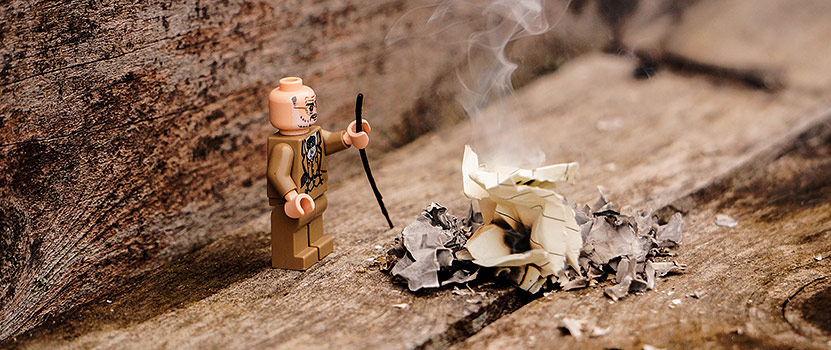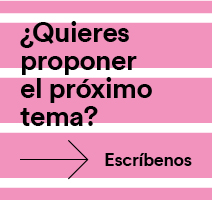Give your opinion
The art of playing Lego

Danila Andreev, alumni of Philology Hispánica and former publisher of BeBrave magazine,
offers a fascinating reflection on the importance of the creative process as one of the pillars of the humanistic
one of the pillars of the humanistic work .

Those of us who played Lego as children know very well that it is a whole exciting world hidden in a beautiful box (and if there are several, all the better). For those of you who have never played Lego or only have a vague idea of it, I invite you to imagine it. I have not chosen this topic out of childish nostalgia or bad taste jokes, but for a clear creative experience.
After all, what is a Lego after all? A coloured box that offers you real adventures, but inside, a whole world that you can build with your own hands: an infinite number of combinations limited only by the number of pieces. But this is not a promotion of Lego, but an image of the universe of humanistic disciplines.
Let's say you are 6 years old and your parents buy you the Harry Potter Lego. The joy is immense. First you assemble what comes out of the box (Hogwarts castle, conference room banquet hall, Hagrid's hut, etc.). One by one you build all the possible scenarios and, after a while, you get a bit bored. Then you order another Lego and the same thing happens. And so on and so forth until you find yourself in front of a pile of Legos, all mixed up and put in the same box.
What would a child do with so much wealth? The answer comes out by itself: mix it all up. Set up a cosmic-universal macro-battle in the best traditions of the classic epic: the ninja team up with the princesses to conquer a farm usurped by the medieval knights and their cruel leader, the cursed Boy with Glasses and his magic wand. And if we add a couple of buggies, laser swords and a brave cowboy Woody (the one from Happy Meal), all the better!
This is how children create worlds in their little heads, but it is not mere fantasising. Thanks to these games, imaginary realities work in the real world. This ability to work and recreate (which, in my opinion, is largely lost in video games) is called transcendental imagination and is very important for the world of Letters. To put it bluntly, it is true creativity.

Alejandro Llano (one of the most acute philosophers of our time and former President of the University of Navarra) wrote that creativity is the "exercise of intelligence as the capacity to get out of assumptions". In life there are many assumptions that the world itself, without malice, imposes on us. It is precisely this overcoming of assumptions that Llano links to the aforementioned transcendental imagination - the ability to shape worlds that are not based on experience, but which it is possible to realise.
We overcome barriers by elaborating worlds that have not been, but can be. To this we could add that responding to reality (and its assumptions, manipulations and limitations) requires a lot of brains, of course, but this is not enough. It requires a great deal of sensitivity.
With all this, the books you have read, the superhero movies, the series of 200,000 chapters, who makes them? Or the great business ideas subject Google, Netflix, Instagram or Facebook... All this, isn't it a Lego? No wonder creative people are sought after nowadays.
But, mind you, it's not about knowing about design, listening to a lot of music and drawing doodles in your notes, but about knowing how to think and thinking in depth, as a response of a finely-tuned sensibility. In the end, it is the "exercise of intelligence", remember: it is intelligence that gives us that "ability to step outside of assumptions".
My point is that the main part of the work of a philosopher, philologist, historian or writer is to think. To configure possible worlds, to generate knowledge, to contribute to culture. To make the Legos of concepts, words and stories. To think and "get out of assumptions" and, ultimately written request, to give life a meaning that neither technology nor health can give.
One problem could be that meaning has become consumable,
but I'm not going to get into that here; that this commentary remains so cool and
and enigmatic, and with the ellipses...
It is clear, however, that everyone thinks to some extent (even if it sometimes seems that some manage to avoid it). We "sensitive intellectuals", humanists, may not think we are the navel of the world, but we have made thinking our profession.
Now imagine a sea of Lego, all the way to the horizon and bottomless. In its depths you can find castles and starships, fictional and historical characters, a couple of lost civilisations and a few monsters that had been men once...
This is our humanistic world. It's scary, huh? It's the stories, ideas, opinions, images, impacts - a huge pile of experiences about human life. And if you don't know how to swim in that sea, you're in bad shape.

But let's not be satisfied with just being good swimmers. Those of us who dedicate ourselves to the study of human beings and their lives are professionals of this sea: fishermen, sailors, divers, beach watchmen or swimming coaches.
Come to think of it, everything official document passes from master to apprentice. So our knowledge is not our own. The university institution responds to this need to train us (or should respond more, in some cases). Specifically, our beloved School from Philosophy and Letters University of Navarra, to which I owe my loyalty and admiration. Not only does it teach us how to swim, but it also enlightens us on official document, and introduces us to the craft of exploring the seas.
With this perspective, in fact, was born BeBrave. I saw it clearly while I was working as its publisher: there was a clear desire on the part of the authors (both students, and the students of high school diploma) to share artistic sensibilities, to untie with restless intellect the knots of society. Each one put his own Lego piece to build something immense (a Millennium Falcon XXL size comes to mind).
For many, these articles, stories or poems have been the first publications in their lives. And I agreement perfectly understand each of those pieces and how we have been polishing and fitting them together. Little by little, I hope, their authors will become a Captain Ahab of Moby Dick, a Ulysses, a Simbad (following the marine allegory).
Although, come to think of it, it's best that everyone ends up being more themselves than ever. I trust that BeBrave is a suitable tool for this.






